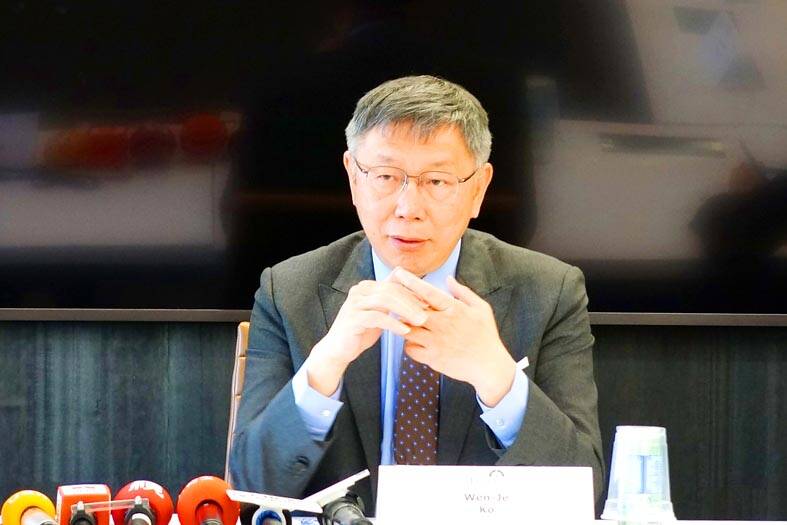Maintaining the “status quo” across the Taiwan Strait is the only option for Taiwan amid an impasse between the US and China, Taiwan People’s Party (TPP) Chairman Ko Wen-je (柯文哲) told a US forum on Monday.
The former Taipei mayor, who is expected to run as the TPP’s candidate in next year’s presidential election, made the remarks at an event hosted by George Washington University’s Elliott School of International Affairs.
With Washington refusing to allow unification with China and Beijing opposing Taiwanese independence, no alternatives exist for Taiwan, said Ko, who is on a three-week visit to the US.

Photo: CNA
As many as 90 percent of Taiwanese favor maintaining the “status quo” of “no unification, no independence and no use of force,” he said.
If elected president, Ko would use “five mutuals” in relations with China to avoid conflict and miscalculation: mutual knowledge, mutual understanding, mutual respect, mutual cooperation and mutual accommodation, he said.
While advocating for more communication between Taipei and Beijing, he said he did not have plans to visit China.
Regarding his national defense policy, Ko said that “only by preparing for war and being able to fight will [we] not fear war.”
However, it was his party’s position that Taiwan should avoid provoking a confrontation with China, he added.
Meanwhile, Beijing’s rumored plan to conduct a “major military activity” in the Yellow Sea this week would only worsen cross-strait relations, he said.
While there was a fixed distance between the two sides of the Strait, “the distance between people’s hearts on both sides is variable, and China should understand this,” he said.
Since leaving for the US on April 8, Ko made stops in New York and Boston before arriving in Washington on Sunday, where he is to remain until Thursday.
While in the US capital, he is scheduled to meet with several US representatives, and pay “important visits” to US officials today, a source familiar with the matter said.

An essay competition jointly organized by a local writing society and a publisher affiliated with the Chinese Communist Party (CCP) might have contravened the Act Governing Relations Between the People of the Taiwan Area and the Mainland Area (臺灣地區與大陸地區人民關係條例), the Mainland Affairs Council (MAC) said on Thursday. “In this case, the partner organization is clearly an agency under the CCP’s Fujian Provincial Committee,” MAC Deputy Minister and spokesperson Liang Wen-chieh (梁文傑) said at a news briefing in Taipei. “It also involves bringing Taiwanese students to China with all-expenses-paid arrangements to attend award ceremonies and camps,” Liang said. Those two “characteristics” are typically sufficient

A magnitude 5.9 earthquake that struck about 33km off the coast of Hualien City was the "main shock" in a series of quakes in the area, with aftershocks expected over the next three days, the Central Weather Administration (CWA) said yesterday. Prior to the magnitude 5.9 quake shaking most of Taiwan at 6:53pm yesterday, six other earthquakes stronger than a magnitude of 4, starting with a magnitude 5.5 quake at 6:09pm, occurred in the area. CWA Seismological Center Director Wu Chien-fu (吳健富) confirmed that the quakes were all part of the same series and that the magnitude 5.5 temblor was

The brilliant blue waters, thick foliage and bucolic atmosphere on this seemingly idyllic archipelago deep in the Pacific Ocean belie the key role it now plays in a titanic geopolitical struggle. Palau is again on the front line as China, and the US and its allies prepare their forces in an intensifying contest for control over the Asia-Pacific region. The democratic nation of just 17,000 people hosts US-controlled airstrips and soon-to-be-completed radar installations that the US military describes as “critical” to monitoring vast swathes of water and airspace. It is also a key piece of the second island chain, a string of

The Central Weather Administration has issued a heat alert for southeastern Taiwan, warning of temperatures as high as 36°C today, while alerting some coastal areas of strong winds later in the day. Kaohsiung’s Neimen District (內門) and Pingtung County’s Neipu Township (內埔) are under an orange heat alert, which warns of temperatures as high as 36°C for three consecutive days, the CWA said, citing southwest winds. The heat would also extend to Tainan’s Nansi (楠西) and Yujing (玉井) districts, as well as Pingtung’s Gaoshu (高樹), Yanpu (鹽埔) and Majia (瑪家) townships, it said, forecasting highs of up to 36°C in those areas